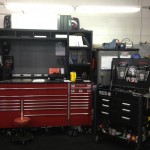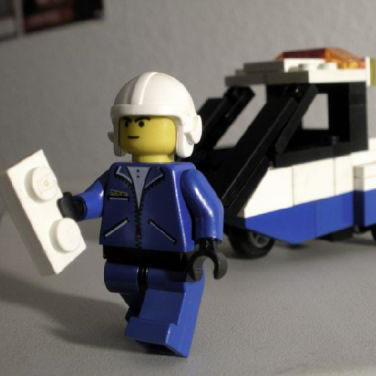I'm a licensed Aircraft Mechanic & Inspector with twenty five-plus years in the field. I've had a varied career so far, with time spent in the sheetmetal, mechanic, and inspection specialties. Most of my time is on heavy Boeing and McDonnell Douglas aircraft, of the passenger, cargo, and experimental type. This career isn't for everyone, but I enjoy it.
Please do NOT ask me to troubleshoot problems with your airplane, that is not what this Q&A is for.
One word: Diversify.
For your long term career health, try to diversify as much as possible in these beginning years of your A&P career.
You will probably get stuck in one department or another, if you work for a large outfit, and that's fine. Learn all you can, and try to be the best you can be (learn the manuals and how to find what you need in them!). But whenever you can, take the opportunity to work outside of your department specialty. Lend a hand to Avionics, Sheetmetal, Composite, Powerplants; whenever you can. An extra hand that knows how to do things will seldom be turned away when it is needed.
"Help me...... buck this rivet, ring out this wire, hold this bolt while I torque the nut, get the vacuum set on this composite repair...." All things that help you learn a little bit more.
Eventually, you'll probably settle into one speciality; maybe start moving up the ladder; and that will make it harder to do other things. So do it now, while you are new. It will pay off in the long run, when you want to try being an inspector, or a manager, or a maintenance planner. Experience helps you make better decisions.
If it is hard to branch out at work, then think about any local aviation museums. Places like the Yankee Air Force are always looking for qualified volunteers. You'll learn a ton from the old retired guys that are usually there.
I have some standard advice I give too: Don't go into deep debt with the tool truck (Snap-On, etc); just get a decent box, and decent tools; you can add the fancy stuff later as you need it or can afford it. People might sometimes tease you for having Craftsman tools or the like, but you'll have more money in your bank account. (Except for the Snap-On ratcheting screwdriver, with the hard plastic handle; those cannot be beaten. Well worth the money)
Don't step on too many toes, or piss too many people off needlessly. This industry is smaller than you can imagine. Often you'll have to go back to work for a place you never thought you'd go back to; or work with/for someone from the past who wasn't your favorite person. Just keep it professional when in doubt.
I would list out several things I kind of wish I'd known when I started.
-Don't expect to get rich!
-Don't immediately go into debt with the tool truck guy. Believe it or not, your off brand rollaway box, and craftsman tools will work just as good as the preimium brands.
-Vet your spouse (or prospective one) for how he/she feels about you working long hours with little notice; or road trips of uncertain duration at the drop of a hat. Not every aviation job will entail things like that, so adjust your career accordingly, if you want to stay married.
-Wash your hands often, wear your personal protective gear (rubber gloves, face sheilds, ear protection) always.
-You are not invincible to chemicals or gravity.
-Learn how to find things in your maintenance manuals and IPC's.
-Learn the FAA regs that apply to you and what you are doing.
-Don't break the rules for a paycheck.
-We all started out fresh as a daisy, and knowing about as much. Don't forget that twenty years from now.
-The airplanes will never love you back.
Strictly speaking; I don't know. If you look in the maintenance manual for any given aircraft, you will find limits for dents. Depth, width, etc. These would be dents that do not have any structural damage of any other kind associated with them.
So, if you took a hammer and dented the airplane 'slightly' it may or may not be airworthy.
Would it fly? Probably; because it would take a terrific amount of surface deformation to ruin the aerodynamics completely.
But technically airworthy, is another matter.
Naba, as an FAA licensed aircraft mechanic & inspector, who has worked primarily in the Mid-Western USA; I can really only answer you based on that experience.
If you plan on coming to the USA to get your Airframe & Powerplant licenses; I would recommend against large "Mechanic Factories" such as Emery Riddle. Choose a smaller school program. My Alma mater is the Lansing Community College aviation technology program, and I liked it very much, and it did not cost too much for a two year degree + my A&P. I can also recommend the aviation maintenance program up at Northern Michigan University; where you can get your A&P, and stick around for a four year degree as well. Those would be my personal recommendations.
If you meant going to some other country, then I'm afraid I cannot help you much.
If you meant becoming an aircraft mechanical engineer, in the respect of being the guy who designs the aircraft; then I'm really really not the guy to give you advice. I'm a mechanic. :D
Business Start-Up Specialist
 Should friends go into business together?
Should friends go into business together?
Auto Mechanic
 If I know nothing about cars, how can I tell if a mechanic is ripping me off?
If I know nothing about cars, how can I tell if a mechanic is ripping me off?
Meter Maid
 Is it tough to have a job that consists exclusively of ruining peoples' days?
Is it tough to have a job that consists exclusively of ruining peoples' days?
I really can't say. I've never been to a real crash site before. From the pictures I've seen, you usually have one of two scenarios: Either there is nothing but little chunks of metal and debris everywhere, or there are several largish chunks of airplane (sometimes just one bent up airplane if it was really low speed). I do know what isn't very realistic. Having engines running after the crash, is pretty far fetched, such as was seen in the opening scenes of Lost and Cast Away. Maybe I've just avoided most plane crash movies.
The system I've seen installed is a satellite based system. A satellite antennae is installed on top of the aircraft, and then a wireless router is located somewhere in the cabin. So no, it doesn't use the same land based signals that your phone uses.
No, I certainly cannot travel for free anywhere. I, along with most other mechanics must pay our own way, just like the rest of the public.
Often, if you work for one of the major commercial air carriers, you can get discounts, or fly free on 'standby'. But, most mechanics do not work for those companies.
-OR-
 Login with Facebook
Login with Facebook (max 20 characters - letters, numbers, and underscores only. Note that your username is private, and you have the option to choose an alias when asking questions or hosting a Q&A.)
(A valid e-mail address is required. Your e-mail will not be shared with anyone.)
(min 5 characters)
By checking this box, you acknowledge that you have read and agree to Jobstr.com’s Terms and Privacy Policy.
-OR-
 Register with Facebook
Register with Facebook(Don't worry: you'll be able to choose an alias when asking questions or hosting a Q&A.)